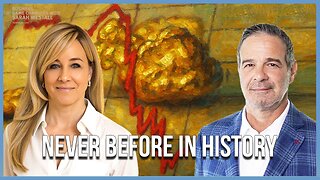Premium Only Content

Episode 1532 Summa Theologica - Part 2 Moral Decision-Making and Conscience
Aquinas examines the process of moral decision-making and the role of conscience. He emphasizes that conscience is a faculty of practical reason that guides individuals in discerning right from wrong. Aquinas argues that individuals have a duty to form a well-informed conscience and to act in accordance with its judgments, as long as those judgments are in line with objective moral principles.
Thomas Aquinas's "Summa Theologica" delves into the realm of moral theology and ethical decision-making. It explores how individuals discern and act upon what is morally right. Here is an overview of Part 2, specifically focusing on Moral Decision-Making and Conscience:
Moral Decision-Making and Conscience:
Ethical Framework: Aquinas begins by establishing an ethical framework based on natural law and divine command. He argues that moral principles are accessible through reason and are grounded in the natural inclinations of human beings.
Here is more information on Aquinas's ethical framework:
Natural Law Theory:
Definition: Natural law theory posits that there is a set of objective moral principles inherent in the natural order of the world. These principles can be known through reason and apply universally to all human beings.
Basis: Aquinas believes that natural law is grounded in the rationality and purposefulness of the created order. It is a reflection of the eternal law (divine order) in the rational creatures.
Accessibility: According to Aquinas, natural law is accessible to all human beings through the use of reason. It does not require specific revelation or religious belief. It is discernible through rational reflection on human nature and the natural world.
Divine Command Theory:
Definition: Divine command theory holds that moral obligations are determined by God's commands. Actions are morally right if God commands them, and morally wrong if God prohibits them.
Integration with Natural Law: Aquinas combines natural law theory with divine command theory. He believes that God is the ultimate source of natural law and that moral principles are an expression of God's rational and purposeful design for the world.
Teleological Perspective:
Teleology: Aquinas's ethical framework is teleological, meaning it is focused on the end or purpose of human existence. He asserts that human beings have a natural inclination towards certain ends, such as self-preservation, procreation, and the pursuit of knowledge.
Alignment with Ends: Virtuous actions, according to Aquinas, are those that align with these natural ends. They contribute to the fulfillment of human nature and the realization of the inherent purposes established by God.
Objective Morality:
Universal Principles: Aquinas's ethical framework implies that there are universal and objective moral principles that apply to all human beings. These principles are not subject to individual preferences or cultural relativism.
Immutable Standards: The moral standards derived from natural law are considered fixed and unchanging. They provide a stable foundation for evaluating the rightness or wrongness of actions.
Application of Reason:
Role of Reason: Central to Aquinas's ethical framework is the role of reason in discerning and applying moral principles. He believes that individuals have the capacity to use reason to understand the natural law and make ethical decisions.
Practical Wisdom (Prudence): Aquinas identifies prudence (practical wisdom) as a cardinal virtue that enables individuals to apply moral principles to specific situations. It involves the ability to make sound judgments about what is morally right.
Integration with Theology:
Harmony with Theology: Aquinas's ethical framework is integrated with his theological beliefs. He believes that natural law is a reflection of God's wisdom and that moral principles are consistent with divine revelation.
Harmony with Virtue Ethics:
Virtue-Centered: Aquinas's ethical framework aligns with virtue ethics, which emphasizes the cultivation of virtuous character. Virtuous actions are those that flow from a virtuous disposition, developed through habituation and moral growth.
In summary, Thomas Aquinas's ethical framework combines natural law theory with divine command theory, emphasizing the objective and rational basis of morality. It integrates theological beliefs with rational reflection on human nature and the natural order. The framework highlights the role of reason, the teleological perspective, and the pursuit of virtuous character in ethical decision-making.
Natural Law: Aquinas emphasizes the concept of natural law, which he believes is imprinted in human nature by God. This law provides a rational basis for discerning what is morally right and wrong. It is derived from a reflection on the purpose and nature of human beings.
Here is an overview of Aquinas's exploration of Natural Law:
Natural Law:
Definition:
Natural Law: Aquinas defines natural law as a rational and objective moral framework that is inherent in the nature of human beings and the natural world. It is a set of principles that guide human conduct towards moral goodness.
Source and Basis:
Grounded in Reason and Divine Order: Aquinas believes that natural law is based on the rationality and purposefulness that God has built into the created order. It reflects God's intention for how humans should live in accordance with their nature.
Accessibility:
Universal and Accessible: Natural law is considered universal, meaning it applies to all human beings regardless of culture, time, or place. It is accessible to all through the exercise of reason, without the need for specific religious revelation.
Moral Principles:
Inherent Principles: Natural law consists of fundamental and self-evident moral principles. These principles are derived from the nature of human beings and the purposes for which they are created.
Primary and Secondary Precepts:
Primary Precepts: Aquinas identifies primary precepts of natural law, which are general principles that guide human actions toward common goods (e.g., self-preservation, procreation, pursuit of knowledge). Secondary precepts are derived from these primary principles and provide more specific guidance in concrete situations.
Universal Application:
Applicability to All Cultures: Aquinas asserts that natural law principles apply universally and are not dependent on cultural or individual preferences. They provide a common moral foundation for all human beings.
Objective Morality:
Objective Standards: Natural law implies that there are objective and unchanging moral standards that apply to all humans. These standards are not subject to personal interpretation or societal consensus.
Criterion for Right and Wrong:
Moral Evaluation: Natural law serves as a criterion for evaluating the moral rightness or wrongness of actions. Actions that align with the natural law are considered morally right, while those that deviate from it are considered morally wrong.
Guidance for Human Flourishing:
Fulfillment of Human Potential: Natural law provides guidance on how individuals can fulfill their human potential and achieve their proper ends. It promotes human flourishing and the realization of inherent human goods.
Harmony with Virtue Ethics:
Virtuous Living: Natural law aligns with virtue ethics, as it emphasizes the cultivation of virtuous character. Virtuous actions are those that lead to the development of moral excellence and contribute to human flourishing.
Limits to Human Law:
Legislation in Accordance with Natural Law: Aquinas argues that human laws should be in accordance with natural law. Laws that deviate from natural law are considered unjust and may not have moral legitimacy.
In summary, Aquinas's exploration of Natural Law in Part 2 of the "Summa Theologica" provides a comprehensive understanding of the moral framework that underlies his ethical thought. Natural law is seen as a rational and objective guide for human conduct, rooted in the rationality and purposefulness of the created order. It offers universal principles for discerning what is morally right and serves as a basis for moral decision-making.
Moral Acts: Aquinas explores the nature of moral acts and categorizes them based on their object, intention, and circumstances. He asserts that the morality of an action is determined by these three elements.
Here's a more detailed explanation of what Aquinas wrote about moral acts:
Moral Acts:
Three Components:
Aquinas identifies three essential components that contribute to the moral character of an action: the object, the intention, and the circumstances.
Object: This refers to the specific action itself, considered in isolation from its context. It is the act that a person chooses to perform, such as telling the truth, stealing, or helping someone in need. Aquinas emphasizes that the object of the action has a significant impact on its moral character.
Intention: The intention refers to the purpose or goal that the agent has in mind when performing the action. It answers the question of why the action is being undertaken. For example, telling the truth with the intention of protecting someone's well-being is considered morally praiseworthy, while telling the truth with the intention of causing harm can be morally problematic.
Circumstances: These refer to the specific conditions or context surrounding the action. They include factors like time, place, the people involved, and any other relevant details. Aquinas acknowledges that circumstances can influence the moral evaluation of an action. For instance, stealing to feed one's starving family may be seen as morally different from stealing for personal gain.
Moral Goodness and Evil:
According to Aquinas, the moral goodness or evil of an action primarily depends on the object. He argues that some acts are inherently good or evil by their very nature, regardless of the intention or circumstances. For example, acts of honesty, justice, and charity are considered intrinsically good, while acts of lying, murder, and theft are considered intrinsically evil.
Role of Intention:
While the object is of primary importance, Aquinas also emphasizes the significance of intention. A good intention can enhance the moral character of an action, while a bad intention can diminish it. For instance, performing an act of charity with a sincere desire to help others is morally commendable, but doing so with the intention of gaining recognition or praise may diminish the moral merit.
Principle of Double Effect:
Aquinas introduces the principle of double effect, which addresses situations where an action has both good and bad consequences. He provides criteria for evaluating such actions. According to this principle, an action with both good and bad effects may be morally permissible if certain conditions are met, such as a good intention and a proportionate reason.
Evaluation of Circumstances:
While the object and intention have primary significance, Aquinas acknowledges that circumstances can also impact the moral evaluation of an action. In some cases, certain circumstances may alter the moral character of an act. For example, self-defense may justify the use of force in specific situations.
Conscience and Moral Acts:
Aquinas emphasizes the role of a well-formed conscience in guiding moral acts. A properly informed conscience enables individuals to make judgments about the rightness or wrongness of specific actions.
Virtue and Habituation:
Aquinas connects moral acts to the development of virtue. He argues that repeated virtuous actions lead to the formation of virtuous habits, which in turn influence future moral decisions.
In summary, Aquinas's discussion of moral acts emphasizes the importance of considering the object, intention, and circumstances in evaluating the morality of human actions. While the object is of primary significance, the intention and circumstances can also influence the moral character of an act. Additionally, the development of virtuous habits through repeated moral acts is crucial in Aquinas's ethical framework.
Principle of Double Effect: Aquinas introduces the principle of double effect, which addresses situations where an action has both good and bad consequences. He provides criteria for evaluating such actions, emphasizing that the intention must be directed towards the good and not the evil effect.
Here are the key components of Aquinas's Principle of Double Effect:
Principle of Double Effect:
Definition:
The Principle of Double Effect states that it may be morally permissible to perform an action that has both good and bad consequences, provided that certain conditions are met.
Four Conditions:
Aquinas outlines four conditions that must be met for an action to be considered morally permissible under the Principle of Double Effect:
a. The Nature of the Act: The action itself must be morally good or neutral. This means that the action should not be intrinsically evil, regardless of the consequences it produces.
b. The Intention: The agent must have a good intention in performing the action. The primary intention must be to achieve the good effect, and any bad effect must be unintended or merely foreseen.
c. Proportionality: The good effect must be proportionate to the bad effect. This means that the positive outcome should outweigh the negative consequence, and the action should not cause excessive harm.
d. No Direct Infliction of Harm: The agent cannot directly cause the bad effect. Instead, the bad effect should be a side effect or unintended consequence of the action.
Examples:
The Principle of Double Effect is often illustrated through various examples, such as:
a. Medical Ethics: In cases of medical treatment, such as pain management, it may be necessary to administer a strong painkiller that has the side effect of potentially shortening a patient's life. If the primary intention is to alleviate pain rather than cause harm, and if the dosage is carefully regulated, the action may be morally permissible.
b. Self-Defense: If a person uses force to defend themselves in a life-threatening situation, there may be unintended harm caused to the aggressor. However, if the primary intention is self-preservation and the force used is proportionate to the threat, it may be morally justifiable.
c. Warfare: In certain cases of warfare, collateral damage may occur, resulting in harm to non-combatants. If the intention is to achieve a just and proportionate military objective, and if steps are taken to minimize civilian casualties, the action may be considered morally permissible.
Evaluation of Consequences:
Aquinas emphasizes that the evaluation of actions under the Principle of Double Effect requires a careful consideration of the foreseeable consequences, both good and bad. The intention behind the action is a crucial factor in determining its moral permissibility.
Limitations:
Aquinas acknowledges that the Principle of Double Effect does not justify all actions with unintended bad consequences. The conditions outlined must be met for the principle to apply.
Ethical Debates:
The Principle of Double Effect has been the subject of ethical debates and discussions, especially in complex and contentious areas like medical ethics, just war theory, and end-of-life decision-making.
In summary, the Principle of Double Effect, as articulated by Thomas Aquinas, provides a framework for evaluating actions with both good and bad consequences. It emphasizes the importance of intention, proportionality, and the nature of the act in determining the moral permissibility of such actions. The principle has applications in various areas of ethics, including medicine, self-defense, and warfare.
Synderesis and Conscience: Aquinas introduces the concept of "synderesis," which he describes as a natural habit of the mind that inclines individuals towards good and directs them away from evil. Conscience, according to Aquinas, is the application of synderesis to specific situations. It is the practical judgment of reason regarding what is morally right or wrong.
Here's a more detailed explanation of what Aquinas wrote about synderesis and conscience:
Synderesis:
Definition:
Synderesis is a term Aquinas borrowed from earlier scholastic philosophy. It refers to a natural habit or innate capacity of the human mind to grasp basic principles of morality. It is often described as the natural inclination or tendency towards what is good and avoidance of what is evil.
Innate Moral Sense:
According to Aquinas, every person possesses a fundamental and innate moral sense. This sense serves as a guiding principle that inclines individuals towards moral goodness and dissuades them from evil.
Precepts of Natural Law:
Synderesis is closely linked to the precepts of natural law. It is through synderesis that individuals have a basic understanding of the foundational moral principles that govern human conduct, such as the preservation of life and the pursuit of knowledge.
Unerring Nature:
Aquinas contends that synderesis is unerring, meaning it provides a reliable and infallible grasp of basic moral truths. It is not prone to error in its fundamental judgments about what is morally good or bad.
Directs Conscience:
Synderesis serves as a sort of compass for the conscience. It provides the foundational principles that guide the moral reasoning of individuals. The principles derived from synderesis act as a starting point for moral reflection and decision-making.
Conscience:
Definition:
Conscience is the practical judgment of reason that applies the general principles of morality (derived from synderesis) to specific situations. It is the faculty or capacity within a person that evaluates the morality of a particular action.
Application of Moral Principles:
Conscience is the faculty that takes the general moral principles known through synderesis and applies them to concrete situations. It assesses whether a specific action aligns with those principles.
Formation and Development:
Aquinas emphasizes that conscience must be properly formed and educated. This involves a process of learning, reflection, and moral growth. A well-formed conscience is one that accurately applies the principles of synderesis to particular cases.
Errors of Conscience:
Aquinas acknowledges that consciences can be mistaken or erroneous. This can occur due to factors like ignorance, misinterpretation of moral principles, or distorted reasoning. He distinguishes between invincible ignorance (ignorance that cannot be overcome) and vincible ignorance (ignorance that can be corrected).
Moral Responsibility:
Aquinas emphasizes that individuals are morally responsible for following their well-formed conscience. This means that they are obliged to act in accordance with their best understanding of what is morally right, even if their judgment may be mistaken.
Binding Nature:
For Aquinas, following one's conscience is a moral duty. Even if a person's conscience is in error, they are still obliged to act in accordance with it, provided they have made reasonable efforts to form it correctly.
Relation to Virtue and Vice:
Conscience is closely connected to the development of virtuous character. A well-formed conscience is more likely to align with moral virtue, while a poorly formed or distorted conscience may lead to vice.
In summary, in Aquinas's ethical framework, synderesis provides the foundational moral principles that are known intuitively, while conscience is the practical faculty that applies those principles to specific situations. Conscience must be properly formed through education and reflection, and individuals are morally obligated to follow their well-formed conscience. However, Aquinas acknowledges that consciences can be mistaken, and distinguishes between invincible and vincible ignorance.
Formation of Conscience: Aquinas discusses the formation of conscience and emphasizes the importance of education and moral guidance. He suggests that individuals should be taught to properly apply moral principles to concrete situations.
Here's a more detailed explanation of what Aquinas wrote about the formation of conscience:
Formation of Conscience:
Education and Instruction:
Aquinas emphasizes the importance of education and instruction in the formation of conscience. This involves learning about moral principles, understanding the precepts of natural law, and studying ethical teachings.
Moral Guidance and Role Models:
Aquinas suggests that individuals should seek moral guidance from trusted sources, such as parents, teachers, and religious leaders. Observing virtuous behavior in others can serve as a model for developing one's own moral character.
Study of Moral Theology:
Aquinas believes that studying moral theology, which involves the systematic exploration of ethical principles, is essential for the proper formation of conscience. This study provides a deeper understanding of moral truths and their application.
Reflection and Contemplation:
Aquinas encourages individuals to engage in introspection and contemplation. Reflecting on one's actions, motives, and the implications of moral choices helps refine the conscience.
Practical Experience:
Engaging in real-world situations and making moral decisions provides practical experience for the conscience. Through these experiences, individuals can learn from successes and mistakes, contributing to the development of a well-formed conscience.
Formation of Virtuous Habits:
Aquinas believes that the repeated practice of virtuous actions leads to the formation of virtuous habits. These habits incline individuals towards moral goodness, making it easier to make morally sound judgments in the future.
Study of Scripture and Moral Exemplars:
Aquinas suggests that studying sacred texts, such as the Bible, and learning about the lives of moral exemplars (saints, prophets, etc.) can provide valuable insights and inspiration for ethical living.
Integration with Religious Faith:
For those who adhere to a religious faith, Aquinas emphasizes the importance of integrating religious teachings and beliefs into the formation of conscience. This includes understanding and applying moral teachings within the context of one's faith tradition.
Avoiding Corrupting Influences:
Aquinas warns against exposure to corrupting influences that may lead to a distorted or poorly formed conscience. It is important to be discerning about the sources of moral guidance.
Responsibility for Formation:
Aquinas places a significant emphasis on the individual's responsibility for actively participating in the formation of their own conscience. This involves a commitment to seeking moral truth, engaging in self-reflection, and pursuing virtue.
Ongoing Process:
The formation of conscience is viewed as an ongoing and lifelong process. It requires continued education, reflection, and practice of moral discernment.
In summary, Aquinas emphasizes that the formation of conscience is a dynamic and ongoing process that involves education, reflection, and practical experience. It requires active engagement with moral principles, virtuous behavior, and sources of moral guidance. A well-formed conscience plays a crucial role in making morally sound judgments and guiding ethical behavior.
Errors of Conscience: Aquinas acknowledges the possibility of errors in conscience. He distinguishes between invincible ignorance (ignorance that cannot be overcome) and vincible ignorance (ignorance that can be corrected). He emphasizes the importance of seeking to form a well-informed conscience.
Here's more detail on what Aquinas wrote about errors of conscience:
Errors of Conscience:
Definition:
An error of conscience occurs when an individual's judgment about the morality of a particular action is mistaken or incorrect. In other words, the person believes that an action is morally permissible or obligatory when, in fact, it is not, or vice versa.
Vincible vs. Invincible Ignorance:
Aquinas distinguishes between vincible ignorance and invincible ignorance:
Vincible Ignorance: This refers to ignorance that could have been overcome with reasonable effort. For example, if a person has the opportunity and resources to learn the correct moral principles but fails to do so, any moral errors resulting from this ignorance are considered vincible.
Invincible Ignorance: This refers to ignorance that cannot be reasonably overcome. If a person genuinely lacks access to the necessary information or education, their ignorance is considered invincible. In cases of invincible ignorance, a person may not be morally culpable for their mistaken judgment.
Responsibility for Vincible Ignorance:
Aquinas holds that individuals are morally responsible for vincible ignorance. This means that if a person fails to make a reasonable effort to form their conscience correctly, they may still be held accountable for any moral errors that result from their ignorance.
Moral Consequences of Errors:
When a person acts in accordance with an erroneous conscience, the moral character of the action is determined by the person's honest belief about its morality, even if that belief is mistaken. This means that a person may not be morally culpable for their actions if they are sincerely mistaken about their morality due to invincible ignorance.
Duty to Seek Truth:
Aquinas emphasizes the importance of seeking truth and forming one's conscience in accordance with correct moral principles. It is the individual's responsibility to make reasonable efforts to learn and understand the moral truths that apply to their actions.
Moral Progress and Growth:
Aquinas believes that through ongoing moral education and reflection, individuals can correct errors of conscience and develop a more accurate understanding of moral principles. This contributes to the ongoing formation of a well-informed and morally sound conscience.
Correcting Errors:
When a person becomes aware that their conscience has made an error, Aquinas holds that they have a duty to correct it. This may involve seeking guidance, learning, and making efforts to align their actions with correct moral principles.
Role of Virtue in Conscience:
Aquinas also emphasizes the role of virtuous character in the formation of conscience. A virtuous individual is more likely to form a well-informed conscience, as they are inclined towards moral goodness and have developed habits of making sound moral judgments.
In summary, Aquinas recognizes that errors of conscience can occur due to factors like ignorance or misinterpretation of moral principles. He distinguishes between vincible and invincible ignorance and holds individuals responsible for vincible ignorance. However, he acknowledges that individuals may not be morally culpable for actions resulting from invincible ignorance. Aquinas emphasizes the importance of seeking truth, ongoing moral education, and the role of virtuous character in the formation of conscience.
Moral Virtues and Conscience: Aquinas highlights the role of moral virtues in guiding conscience. Virtuous habits help individuals make morally sound judgments, and a well-formed conscience is more likely to align with moral truth.
Here's more detail on how moral virtues and conscience are interrelated according to Aquinas:
Moral Virtues and Conscience:
Definition of Moral Virtues:
Moral virtues are habits of character that incline individuals towards morally good actions. They are acquired through repeated practice of virtuous behavior and are essential for leading a morally upright life.
Role of Virtue in Conscience Formation:
Aquinas maintains that moral virtues are integral to the formation of conscience. When a person cultivates virtuous habits, their conscience becomes more attuned to making morally sound judgments. Virtues guide the conscience by shaping one's moral disposition.
Virtues as Dispositions to Act Morally:
Moral virtues, such as honesty, courage, justice, and compassion, predispose individuals to act in ways that align with moral goodness. These dispositions influence how a person perceives and responds to moral situations, providing a framework for conscience.
Virtues as Guides for Action:
Aquinas argues that moral virtues serve as guides for practical decision-making. When a person possesses virtues, they are more likely to recognize and choose actions that are in line with moral principles.
Alignment with Natural Law:
Aquinas sees moral virtues as closely aligned with the precepts of natural law. Virtuous actions are those that contribute to the common good and the fulfillment of human nature, in accordance with natural law principles.
Formation of a Virtuous Conscience:
A person with a well-developed set of moral virtues is said to possess a "virtuous conscience." This conscience is more attuned to making judgments that lead to morally good actions.
Complementary Relationship:
Conscience and moral virtues work together in guiding moral behavior. While conscience provides the intellectual framework for moral discernment, virtues provide the moral character and disposition to act in accordance with that discernment.
Role of Prudence:
Aquinas emphasizes the importance of the virtue of prudence (practical wisdom) in moral decision-making. Prudence enables individuals to apply moral principles to specific situations with discernment and wisdom.
Formation of Virtuous Habits:
Virtues are formed through repeated acts of virtuous behavior. As individuals consistently choose morally good actions, they develop virtuous habits that become ingrained in their character.
Moral Exemplars:
Moral exemplars, or individuals who embody virtuous qualities, serve as models for the development of moral virtues. Observing virtuous behavior in others can inspire individuals to cultivate similar virtues.
Conscience as a Guide for Virtuous Action:
While virtues guide the conscience, a well-formed conscience, in turn, helps individuals discern which virtues to apply in specific situations. It provides the intellectual framework for understanding the moral principles that underlie virtuous behavior.
In summary, in Aquinas's ethical framework, moral virtues and conscience are intimately connected. Virtues shape one's moral character and disposition, guiding the conscience in making morally sound judgments. A virtuous conscience, informed by natural law principles, is better equipped to discern and choose actions that contribute to the common good and the fulfillment of human nature.
Responsibility and Accountability: Aquinas emphasizes that individuals are responsible for their moral choices and actions. A well-formed conscience enables individuals to act in accordance with moral principles, and they are held accountable for their decisions.
Here's more detail on how Aquinas addresses responsibility and accountability in relation to moral actions:
Responsibility and Accountability:
Definition of Responsibility:
Responsibility refers to the moral obligation of an individual to take ownership of their actions, including the consequences that flow from those actions. It involves recognizing one's agency in making choices and bearing the moral weight of those choices.
Moral Agency:
Aquinas emphasizes that human beings possess moral agency, which means they have the capacity to make deliberate choices and are capable of distinguishing right from wrong. This capacity for moral agency implies a responsibility for one's actions.
Free Will and Rationality:
Aquinas argues that humans have free will and rationality, which enable them to deliberate and make choices based on reason. This freedom of the will is integral to moral responsibility.
Intentions and Motives:
Aquinas considers intentions and motives as central to moral responsibility. He asserts that individuals are responsible not only for their actions but also for the intentions behind those actions. A morally good intention can enhance the moral character of an action, while a bad intention can diminish it.
Moral Culpability:
Aquinas acknowledges that individuals can be morally culpable for their actions. This means they can be held responsible for the moral quality of their choices. It also implies that individuals may be subject to moral praise or blame based on their actions.
Principle of Double Effect:
Aquinas introduces the Principle of Double Effect to address situations where an action produces both good and bad consequences. This principle considers the intention and proportionality of the action, which are factors that impact the moral responsibility of the agent.
Ignorance and Responsibility:
Aquinas distinguishes between vincible and invincible ignorance. While vincible ignorance (ignorance that could have been overcome with reasonable effort) can affect moral responsibility, invincible ignorance (ignorance that cannot reasonably be overcome) may mitigate culpability.
Mitigating Circumstances:
Aquinas acknowledges that there may be circumstances that mitigate an individual's moral responsibility. These circumstances could include factors like coercion, extreme duress, or other conditions that limit a person's capacity for free and rational decision-making.
Formation of Conscience:
Aquinas emphasizes the importance of a well-formed conscience in determining moral responsibility. A properly educated and developed conscience enables individuals to make more accurate moral judgments and take responsibility for their actions.
Accountability to God:
Aquinas, as a theologian, also addresses the ultimate accountability of human beings to God. He believes that ultimately, individuals are accountable to God for their moral actions, and will be judged according to their deeds.
Practical Implications:
Understanding responsibility and accountability in moral actions has practical implications for how individuals live their lives. It guides them in making choices that align with moral principles and takes into consideration the consequences of their actions.
In summary, in Aquinas's ethical framework, responsibility and accountability are tied to the concept of moral agency. Individuals are considered responsible for their actions based on their capacity for rational choice and free will. This responsibility includes being accountable for the intentions and motives behind their actions. However, Aquinas also acknowledges that factors like ignorance and mitigating circumstances can influence moral culpability. Ultimately, individuals are seen as accountable for their actions, both in a temporal sense and in their ultimate accountability to God.
Divine Assistance: Aquinas underscores the role of divine grace in moral decision-making. He believes that God provides assistance to individuals in discerning and choosing what is morally right.
Here's a more detailed explanation of how Aquinas addresses the idea of divine assistance:
Divine Assistance:
Dependence on Divine Aid:
Aquinas emphasizes the fundamental idea that human beings are dependent on divine assistance for their moral and spiritual well-being. He argues that without the aid of God, humans cannot attain their ultimate purpose, which is union with the divine.
Grace as Divine Assistance:
Central to Aquinas's understanding of divine assistance is the concept of grace. Grace is seen as the supernatural assistance and favor of God, freely given to humans to enable them to achieve spiritual growth, moral goodness, and salvation.
Different Forms of Grace:
Aquinas distinguishes between different types of grace, including actual grace (temporary divine assistance provided to perform specific virtuous actions) and sanctifying grace (a stable and habitual state of grace that transforms the soul, making it capable of meriting eternal life).
Cooperation with Grace:
Aquinas emphasizes that humans are active participants in their own spiritual development. While divine assistance is crucial, individuals must cooperate with grace by freely choosing to follow moral principles and virtuous actions.
Role of Free Will:
Aquinas maintains that God respects human free will and does not force individuals to act against their own choices. Divine assistance operates in harmony with human free will, providing the necessary support for individuals to make virtuous decisions.
Moral Growth and Virtue:
With divine assistance, individuals are capable of achieving moral growth and developing virtuous character. Grace helps them overcome moral obstacles, resist temptation, and grow in virtues such as love, faith, hope, and charity.
Attainment of the Beatific Vision:
Aquinas asserts that the ultimate purpose of human life is the beatific vision, which is the direct, intuitive knowledge and contemplation of God in the afterlife. This vision can only be attained through divine assistance and the sanctifying grace that prepares the soul for union with God.
Prayer and Sacraments:
Aquinas underscores the importance of prayer and participation in the sacraments as means through which individuals can receive divine assistance. These practices create a receptive disposition for the reception of grace.
Theological Virtues:
Aquinas identifies the theological virtues (faith, hope, and charity) as infused virtues that are directly bestowed by God. These virtues are essential for a person's relationship with God and their pursuit of the ultimate goal of eternal union with the divine.
Ongoing Need for Divine Assistance:
Aquinas maintains that human beings require divine assistance throughout their lives. The journey towards moral goodness and spiritual fulfillment is a continuous process that depends on the ongoing reception of grace.
Confidence in God's Assistance:
Aquinas encourages individuals to trust in God's providence and to have confidence in the efficacy of divine assistance. He believes that God's grace is sufficient to lead individuals towards their ultimate end.
In summary, in Aquinas's theological and philosophical framework, divine assistance, particularly in the form of grace, is seen as essential for human moral and spiritual development. It enables individuals to grow in virtue, resist temptation, and ultimately attain union with God. This divine assistance operates in harmony with human free will, allowing individuals to actively participate in their own moral and spiritual journey. Through prayer, participation in sacraments, and a trusting relationship with God, individuals open themselves to receive and cooperate with the divine aid that leads to their ultimate fulfillment.
In summary, Part 2 of Aquinas's "Summa Theologica" provides a comprehensive exploration of moral decision-making and conscience. It establishes a framework for understanding how individuals discern and act upon what is morally right, emphasizing the role of natural law, conscience, virtue, and divine assistance. Aquinas's writings in this section continue to be influential in the fields of moral theology and ethics.
Next Episode: Law and Morality:
Aquinas delves into the relationship between human law and moral law. He argues that human laws should be in harmony with the eternal law, which is the divine wisdom governing the universe. Aquinas distinguishes between natural law, which is based on the rational understanding of human nature and governs moral actions, and positive law, which is man-made legislation. He asserts that positive laws must conform to the principles of natural law to be morally valid.
Next Episode: Grace and the Role of Divine Assistance:
Aquinas explores the influence of divine grace in moral and spiritual development. He distinguishes between actual grace, which is God's intervention in specific situations to assist individuals in doing good, and sanctifying grace, which is the indwelling of God in the soul. Aquinas emphasizes the role of grace in perfecting human nature, healing the effects of sin, and enabling individuals to pursue moral excellence.
Throughout Part II, Aquinas provides a comprehensive framework for understanding morality and ethical behavior. He integrates principles of natural law, virtue ethics, and divine grace to guide individuals in their moral decision-making and pursuit of the ultimate human good. By exploring these topics, Aquinas offers insights into the moral life and the cultivation of virtues necessary for human flourishing.
Part III of the Summa Theologica, titled "Christ, Sacraments, and Eschatology," delves into key aspects of Christian theology related to the person and work of Christ, the sacraments of the Catholic Church, and eschatology (the study of the end times). Here's a deeper dive into the main themes covered in Part III:
Next Episode: The Person and Work of Christ:
Aquinas explores the mystery of the Incarnation—the belief that Jesus Christ is both fully God and fully human. He examines questions related to the nature and hypostatic union of Christ, emphasizing that Jesus is one divine person with two natures, divine and human. Aquinas discusses Christ's role as the Redeemer and Mediator between God and humanity, highlighting the significance of his sacrificial death on the cross for the forgiveness of sins.
Next Episode: The Sacraments:
Aquinas devotes a significant portion of Part III to the sacraments, focusing primarily on the seven sacraments recognized by the Catholic Church: Baptism, Confirmation, Eucharist, Penance (Confession/Reconciliation), Anointing of the Sick, Holy Orders, and Matrimony. He explores the nature, efficacy, and significance of each sacrament, emphasizing their role as visible signs instituted by Christ to confer grace upon the faithful.
Next Episode: The Eucharist:
Within the sacraments, Aquinas gives special attention to the Eucharist. He addresses the doctrine of transubstantiation—the belief that the bread and wine used in the Eucharist become the actual body and blood of Christ while retaining the appearances of bread and wine. Aquinas provides philosophical and theological arguments to support this doctrine and explores its implications for the life of the Church and the faithful.
Next Episode: Eschatology:
Aquinas concludes Part III by delving into eschatology—the study of the last things. He examines topics such as death, resurrection, judgment, heaven, hell, and purgatory. Aquinas provides a nuanced understanding of these concepts within the framework of Christian theology, drawing from biblical sources, Church teachings, and philosophical reasoning.
Aquinas's exploration of Part III reflects his engagement with Scripture, the teachings of the Church, and his own theological insights. He offers a comprehensive understanding of the person and work of Christ, the sacraments as channels of grace, and the ultimate destiny of humanity. By examining these topics, Aquinas provides a theological framework for understanding the central doctrines and practices of the Catholic faith.
-
 2:05:58
2:05:58
TimcastIRL
7 hours agoSHOTS FIRED, Leftists ATTACK Coast Guard & Feds In SHOCK Terror Attack | Timcast IRL
232K130 -
 1:07:25
1:07:25
Man in America
13 hours agoThe BRICS War on the Dollar Just Hit Endgame—What's Next Changes EVERYTHING
20.3K12 -
 3:23:45
3:23:45
SOLTEKGG
4 hours ago🔴LIVE - Community Game Night - GIVEAWAY
24K2 -
 LIVE
LIVE
SpartakusLIVE
6 hours ago#1 Friday Night HYPE, viewers GLUED to the screen
366 watching -
 55:50
55:50
NAG Podcast
5 hours agoAda Lluch: BOLDTALK W/Angela Belcamino
8.73K1 -
 LIVE
LIVE
VapinGamers
2 hours agoKellan Graves - Fallen - Game Review and Game KeyGiveaway - !rumbot !music
144 watching -
 1:06:41
1:06:41
MattMorseTV
5 hours ago $0.16 earned🔴Trump PREPARES for WAR with VENEZUELA.🔴
36.2K61 -
 39:59
39:59
Clownfish TV
9 hours agoHollywood NO MORE! Animation Industry Will DIE First?! | Clownfish TV
8.16K2 -
 25:57
25:57
The Kevin Trudeau Show Limitless
2 days agoThe Sound Of Control: This Is How They Program You
61.2K19 -
 47:41
47:41
Sarah Westall
4 hours agoNew Actions by Insiders Never Seen in History – Bitcoin Moves Ahead w/ Andy Schectman
18.3K2